Years ago, the only thing Israel exported was oranges. The product was the Jaffa orange, and it was said that it couldn’t be replicated anywhere. As the country grew, so did the variety and extent of its exports, from avocadoes and tomatoes to semiconductor chips and underwear.
The thinking that evolved is that while Israelis are great customers, the local market is small and you “gotta think global” if you want to sell serious quantities. Another challenge was that the products were often undercover, like the chips that Intel puts inside its computers and the private label panties that Delta Galil makes for Victoria’s Secret, Marks & Spencer, and Calvin Klein.
Today, a slew of new Israeli exports and businesses are thinking beyond single or even multiple products. They’re selling concepts, as presented in brick-and-mortar storefronts. From hotels, trendy clothing and scented soaps to coffee, jewelry and chocolate, these companies are marketing more than just the inventory on their shelves. They are penetrating the global market on an entirely new level, putting Israeli creativity and customer service to the Western shopper test.
ISRAEL21c brings you its picks for the top ten Israeli chains that are expanding beyond the country’s narrow environs. Some are tri-continent, others are moving more slowly. But from the US to Asia and Australia, Europe, Eastern Europe and the Netherlands, Israeli brand names are becoming facts on the ground.
1. FATTAL HOTELS
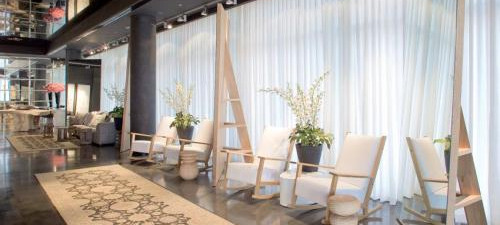
It’s time for the rest of the world to discover the wonders of the Israeli breakfast. At least that could be the reason behind Israeli hotelier David Fattal’s decision to make the Fattal hotel chain an international brand. Or it could just be Fattal’s success in spreading the Leonardo brand worldwide.
The Haifa-born Fattal started out as a waiter before climbing the corporate ladder and becoming managing director of the Afrika Hotels chain. He founded his own hotel management company, Fattal Hotels, in 1997, and now owns 32 Leonardo-branded hotels in Germany, Switzerland and Belgium, and 31 hotels in Israel.
Last August, Fattal acquired 12 of his 31 hotels in Israel, including all Sheraton hotels and three Accor hotels. The ‘flagship’ hotel in Israel, Leonardo Boutique Hotel Tel Aviv, is a city hotel designed by renowned Israeli architect Moshe Kastiel and has received mixed reviews for its dark interiors, but high marks for its location and business trip comforts.
2. LALINE
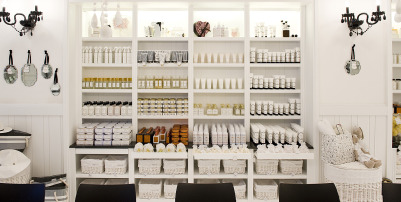
The fanciful white-and-black, vintage-themed shops of the Laline brand began appearing abroad in 2006, with the opening of two branches in Oslo, Norway and another in Los Angeles.
With a total of 43 branches in Israel, the beauty and skin care product chain was established in 1999 by two cousins, and sources many of its aromas and products from the Provence region of France, with the rest from Israel.
The Israeli shops are spread countrywide, from Nahariya in the north to Eilat in the south, with four branches in Jerusalem, two on Tel Aviv’s fashionable Sheinkin Street and others in several Tel Aviv malls.
Once the store began branching abroad, it continued to open shops internationally to the delight of many customers, including Madonna. You can find Laline in Bucharest, and there are plans to open additional stores in Barcelona, the US and the Far East.
In March, the company – which is half-owned by Fox (see below) and half by the original founders – announced that it has signed an agreement with a UK retailer, Brand Empire, to set up 30 stores across the UK at a cost of $30 million. The first store is to open this month, and five more will follow this year. The stores will be operated by franchisees.
3. SABON
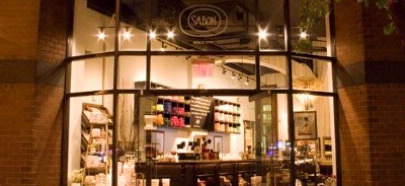
Laline isn’t the only Israeli cosmetics company that sells its wares abroad. Sabon, the Israeli soap and candle company, has 20 branches in Israel and 30 worldwide, including in the US, Canada, Romania, Italy, Poland and Holland.
It was started back in 1974 by a young couple making lavender soap in their backyard, using an aboriginal recipe they discovered during their Australian travels. Using local herbs and flowers, they created hearty blocks of soap that were sliced into chunks for their friends and family.
The entrepreneurs who launched the Sabon stores eventually expanded on the soaps, selling them by the pound, and adding a roster of creams and lotions, oils and candles to their inventory, all much touted by beauty bloggers and the Manhattan store was even used in a scene for the TV show Sex in the City.
4. CASTRO
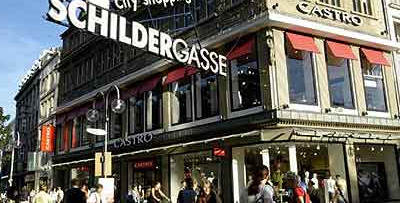
What started out as a family-run atelier has become something of an international fashion brand, with the still-family-run Castro now owning 164 outlets worldwide, including 118 in Israel and 46 in Germany, Russia, Kazakhstan, Thailand, Switzerland, Romania, Ukraine and Holland.
From its early days as an apartment boutique and then basement factory, Castro has always been a trend-setting company, whether incorporating scraps from Carmel Carpets, Israel’s leading carpet manufacturer, into coats, to opening its concept store on Tel Aviv’s downtown Dizengoff Street in 2003, one of the first concept stores in Israel.
Castro was also one of the first Israeli chains to join the shopping mall trend, opening stores in malls as fast as they gained in popularity, and strengthening the Castro name.
By the year 2000 Castro had also established Castro Men, and in 2003 began opening stores in Europe, first working with German company Otto to open a chain of Castro stores in Germany. Two years later, Castro had opened stores in its other locations worldwide.
5. FOX
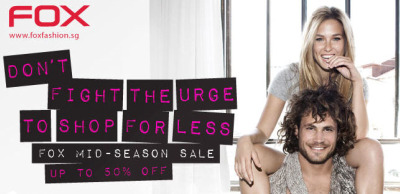
Like Castro, Fox clothing also had a modest beginning, with its establishment in 1942 as an underwear manufacturer under the name Trico Fox.
Things had changed by 1992, when the family-owned company, now known as Fox-Wizel, created the Fox concept – fashionable, casual and inexpensive clothing and stores for the whole family.
There are now 200 retails shops in Israel and more than 100 abroad, including in China, Thailand, Panama, Romania, Italy, Singapore, the Philippines and Russia.
Interestingly, Fox also has a joint partnership in Laline Candles & Soaps, which could explain the propensity for both these chains to expand abroad.
6. AROMA
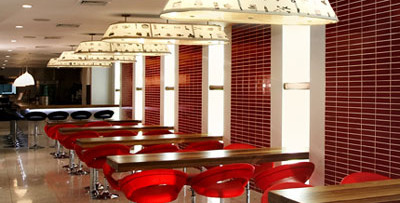
It’s because of Aroma and several other Israeli coffee chains that Starbucks didn’t make it in the holy land when the ubiquitous American chain gave it its best espresso shot some seven years ago.
Aroma’s trademark red-and-black coffeehouses have been churning out some of Israel’s best hafuchs (that’s Hebrew for “cappuccinos”) for the last 15 years, and decided to bring their skills to NYC in Manhattan’s Soho neighborhood four years ago.
With more than 100 outlets in Israel, Aroma is considered the country’s most successful coffee retailer. In 2000, the company began branching out beyond Jerusalem where it is headquartered.
In 2006 it opened overseas with its second international branch in Toronto, Canada. Aroma opened its first European coffee shop in Ukraine in 2009, and currently operates branches in Romania, Cyprus and Kazakhstan under the brand name Marrone Rosso, which means “brown and red.”
7. PADANI
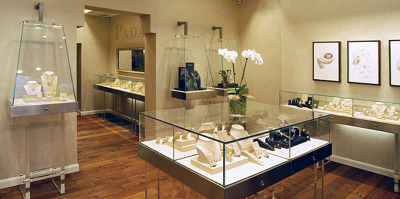
Founded by a family of Belgian diamond merchants, the Padanis opened their first jewelry studio in Tel Aviv in 1947.
Since then, Padani has opened six branches throughout Israel, and specializes in unique designs as well as representing fine jewelry companies such as Patek-Phillipe, Cartier, Bulgari and Breitling.
The company opened its first overseas branch in 2006, setting up a concept store in Kent, England, to serve its loyal British clientele.
8. MAX BRENNER
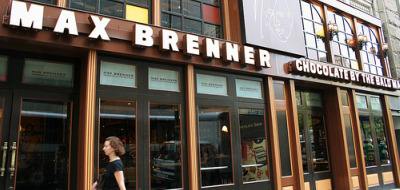
When chocolatier Max Brenner first appeared in Israel, locals were charmed by the concept of gourmet chocolates created by a bald man, as touted in the whimsical packaging.
Fourteen years later, the truth is out. Max Brenner was started in Ra’anana by two men, Max Fichtman and Oded Brenner, who created the fictional bald man from a combination of their names.
The company is now owned by the Strauss Group, after first being acquired by Elite in 2001, which was then purchased by Strauss.
The six Israeli Max Brenner stores have been joined by 18 in Australia, two in Singapore and two in the Philippines. The two stores in the US – both in Manhattan – will soon be joined by one in Boston and another in Las Vegas.
9. SUPER-PHARM
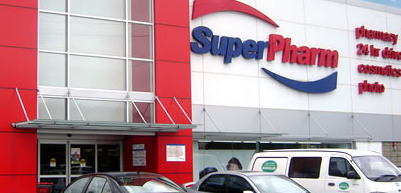
The most ubiquitous Israeli pharmacy chain, with 137 stores in Israel Super-Pharm doesn’t limit its Life private label to this country but also has 20 stores touting the Life products in Poland and 53 more in China.
Owned by the Canadian Kofflers, who also own Shoppers Drug Mart in Canada (once known as Koffler’s Drugs) after a 1970s visit to Israel Murray Koffler decided to set up a chain similar to the one he had at home.
It was the first Israeli pharmacy to be open on the Sabbath and to sell products beyond pharmaceuticals.
10. MICHAL NEGRIN
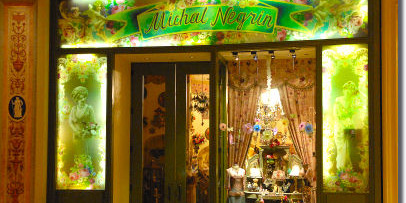
You either love or hate her romantic designs, but Michal Negrin, the former stand holder at crafts fairs, has become a well-known brand name in vintage-inspired, sparkling stone jewelry, clothing and accessories.
The former member of a kibbutz first began selling her collection at the bi-weekly Nahalat Binyamin craft fair in Tel Aviv, and then opened her first shop – with her husband, Meir – on the neighboring Sheinkin Street.
More than 20 years later, they have 26 stores worldwide, in Japan, Singapore, Australia, Paris, Rome, Madrid, London, Prague, New York and New Mexico, with 19 stores in Israel.












